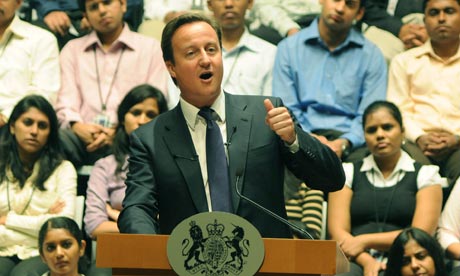David Cameron is currently on the next stage of his international tourm and has ruffled some feathers with his views on various issues. I don't agree with everything Cameron has said (describing Gaza as a prison camp was a little bit.....incorrect for my tastes!) but I do appreciate a leader being honest with what he believes. Brown never seemed to have an opinion on anything, so it is nice to hear actual opinions and policies from the Prime Minister.
Arguably his most controversial comments were when he stated that it was unacceptable for Pakistan to allow terrorist training camps to flourish within Pakistan, therefore promoting terrorism throughout the world. Now, as far as I am concerned, these comments are either right or wrong. Pakistan is either allowing terrorist training camps to flourish within its borders, and as a result should clamp down on it - or it is not allowing them to flourish, and therefore should refute Mr Cameron's remarks. The statement is either a truthful one, and must therefore be accepted, or it is false and must be refuted.
Yet, this question is not the one being asked, or answered at all in the resulting discussion about the comments. The discussion is less on whether or not the comments were right, but whether or not they were 'hurtful' or 'offensive'. Take Pakistan's High Commissioner who said that people in Pakistan were "really hurt" by Cameron's comments and called for him to 'make amends'.
Now, whether or not the remarks are 'hurtful' are irrelevant - the question should be whether or not they are true. Only on something small, like whether or not you enjoyed a meal, does one sacrifice truth for someone's feelings. But on an issue as large as international terrorism, feelings are irrelevant, the question is only one of truth. If Pakistan are indeed allowing terrorism to flourish, as appears to be the case, then Cameron is well within his rights and responsibilities to say so in strong terms to the Pakistani goevernment. It would be irresponsible not to.
The High Commissioner should be saying either "Yes we need to do more" or "No, Mr Cameron's comments are innacurate, we are doing enough etec." But to say they are hurtful really misses the point, but it touches on a side of politics that has tainted a lot of political debate. It is really a left-wing influence that has tainted the mainstream of thought and discussion.
 The influence is one of an essentially relativistic brand. For many on the left, a thing does not have an intrinsic, objective moral value - it is entirely subjective. Therefore, many issues come down to either intentions or feelings, not right or wrong. So often on political issues, you hear about 'compassion' 'hurtfulness', 'understanding' etc instead of getting things done, and whether measure are right or wrong, working or failing, true or false. This is because it is the land of the subjective intention that the left work in.
The influence is one of an essentially relativistic brand. For many on the left, a thing does not have an intrinsic, objective moral value - it is entirely subjective. Therefore, many issues come down to either intentions or feelings, not right or wrong. So often on political issues, you hear about 'compassion' 'hurtfulness', 'understanding' etc instead of getting things done, and whether measure are right or wrong, working or failing, true or false. This is because it is the land of the subjective intention that the left work in.From this understanding of truth, Cameron hurt people's feelings - therefore he shouldn't have said what he said. However, for those of us in America and Britain who want to stop terrorist attacks, the real question is "Was David Cameron right?" - the answer is not yet conclusive, but it is that question that is the judge of the rightness of his comments, not whether or not it offended or 'hurt' people.
As a result, if David Cameron does believe that Pakistan is not doing enough in its responsibilities, then it is his duty to say so in the strongest terms - and he should be commended, not criticised, for doing so.

No comments:
Post a Comment